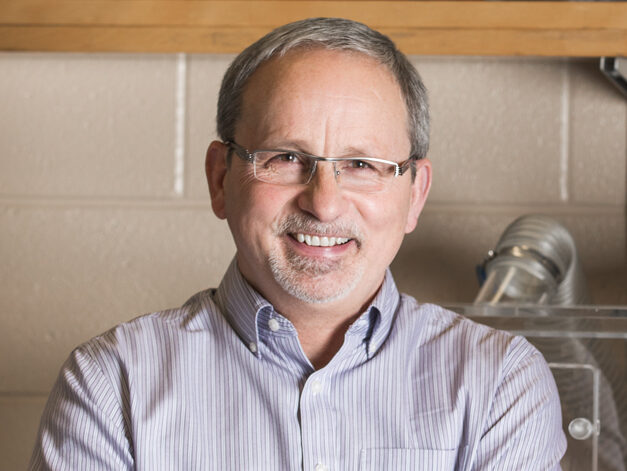
Advancing Knowledge to Action
from Cell to Community
School of Kinesiology & Health Science eBulletin | Fall 2024
Photo by Mario Verduzco on Unsplash

HELLO, BONJOUR, BOOZHOO. As Chair of the School of Kinesiology & Health Science, I am delighted to welcome you to this inaugural edition of our eBulletin. Over this past term, I have had the pleasure of learning more about our accomplished students, alumni, staff, and faculty members and the ways in which they are advancing leading edge research and discovery, excellence in teaching, and dynamic local and global community partnerships. Everyday, our School is putting into motion its vision of being Canada’s leading academic centre for knowledge creation, integration, and dissemination about physical activity and its importance for human health, health science and society.
In this inaugural eBulletin, you will read about some of the different ways in which the members of our vibrant School are advancing positive social change from cell to community through physical activity and health sciences. We welcome your feedback and your stories of creating positive change through physical activity and health sciences. Share them with us by emailing us at kinchair@yorku.ca.
I am privileged to be able to engage with and work alongside colleagues who share my enthusiasm and pride for our School, including a tremendous senior leadership team: Alison Macpherson (Associate Chair), Nicolette Richardson (Undergraduate Program Director), Anne Moore (Associate Undergraduate Program Director), Olasunkanmi A. J. Adegoke (Graduate Program Director), and Sharon Pereira (Operations Manager)
As we bring the Fall 2024 term to a close, I hope the highlights below energize you for an exciting new year ahead.
Parissa Safai, PhD
Professor and Chair, School of Kinesiology & Health Science, Faculty of Health
School of Kinesiology & Health Science at a Glance

2,860
Undergraduate Students

161
Graduate Students

64
Full-time Faculty

$5M+
generated by School of Kinesiology & Health Science researchers in 2023-2024
Celebrating Our Students
Finding Opportunity in Challenge, Our Students Transform Problems in Possibilities
Meet some of our undergraduate and graduate students who are creating positive social impact through meaningful community engagement, award-winning knowledge dissemination, and ground-breaking research.

Fourth-year undergraduate student Ruth Zaza’s accomplishments as a leader committed to health equity, community engagement, and youth empowerment speak for themselves. As a volunteer member of the Black Creek Community Health Centre, Ruth worked alongside an interdisciplinary care team to provide accessible blood pressure and blood sugar checks. She partnered on the "Black Donors Save Lives" campaign to address racial disparities in stem cell donor representation and, as the current Director of Youth Engagement at The Change-Makers Foundation, is leading the “Pre[PAIR]ing Youth” program to empower Black middle and high school students in STEAM (Science, Technology, Engineering, Arts, Mathematics).
Newly minted PhD Luca Delfinis, who undertook his doctorate under the supervision of Christopher Perry and is now an Associate Scientific Liaison at BenchSci, was the first person in the world to show that muscle weakness precedes muscle wasting in cancer. This ground-breaking research in metabolic dysfunction is changing the ways in which oncologists think about what causes frailty in cancer patients and holds promise for the development of new drugs and therapeutics that better prevent muscle weakness. This foundational discovery has huge implications as muscle weakness negatively impacts survival rates among cancer patients.


Kinesiology & Health Science doctoral student Jess Nachman, studying under the supervision of Lyndsay Hayhurst, recently won the Outstanding Sociology of Sport Journal Article Award, as lead author, for their paper connecting Indigenous theories of refusal to Indigenous youth sport participation in Canada. With research interests in decolonial methodologies, arts-based methods, physical culture, and mobility justice, their current SSHRC-funded research explores how racialized and queer communities in Toronto use bicycles to survive and resist state violence.
Prior to beginning her Master’s program under the supervision of Anthony Scime this Fall, Jaryeon Lee was one of 20 senior undergraduate students from across Canada participating in The Stem Cell Network’s Summer Studentships Program, a competitive program to support senior undergraduate students to experience rigorous stem cell and regenerative medicine research during the summer. The program includes a presentation competition and Jaryeon's work was ranked highest by an adjudicating panel. For this, she was awarded a travel bursary to present her research at the Till and McCulloch Stem Cell Conference held in Montréal in November 2024.

Excellence in Discovery and Innovation
Creativity, Collaboration, and Transformation in Education and Research
Recognized as leaders in physical activity and health sciences research, education, and practice, locally to globally, our Kinesiology & Health Science faculty members are leading positive change from cell to community.

Supported by faculty advisor Michael Kalu (right), Kinesiology & Health Science student Jonathan Wright (left) shared his work-integrated learning experiences at Sunnybrook's Odette Cancer Centre.

Kinesiology & Health Science's David Hood received a $1-million+ CIHR grant to study the role of lysosomes in muscle health and decline

Exploring how bicycles can help address gender inequity and barriers to education and health-care access, Lyndsay Hayhurst's documentary Changing Gears enjoyed its world premiere earlier this month.

As Director of the LaMarsh Centre for Child & Youth Research, Rebecca Bassett-Gunter works alongside faculty and students across the campus and country to showcase and support community-engaged interdisciplinary research on child and youth health and well-being.

Reflecting its influence on the global scientific community, York's Muscle Health Research Centre (Christopher Perry, Director, pictured above), is ranked fourth in the world by ScholarGPS Institutional Rankings in skeletal muscle research.

Recognizing the importance of a deep connection to the land and nature as an integral part of decolonization, Larkin Lamarche invites students to engage in land-based learning, which integrates traditional ecological knowledge and Indigenous ways of knowing.
Our Kinesiology & Health Science Family
Our Community is the Foundation to Our Success
Through their daily efforts to build a healthy place to learn, teach, research and work, our remarkable community is pivotal to the School's achievements in education, research, and leadership.
Burak Reisyan (left) has just recently joined the KHS Team as Program Secretary this past September. Burak joined the KHS Team this past September, prior to that he worked in Parking Services and was the Administrative and Events Coordinator for Calumet and Stong College, he is a proud York alumnus, holds a BA Honours in Psychology. In his spare time Burak enjoys exercising, cycling, and reading about politics and philosophy and is continuing with his education part-time in a degree program in Work and Labour Studies.


Our newest staff member, Gary Myers, joins the School as Administrative Assistant to the Chair after working at York University in various departments since 2014. Since 2021, Gary has been a PhD student in History at York University and is expecting to defend his thesis in early 2025. His doctoral research focuses on gay nostalgia, oral history, and Toronto’s Church-Wellesley LGBTQ2+ Village history. He pursued his PhD for personal not professional reasons and hopes to write a book from his doctoral research.

Former Kinesiology & Health Science staff members Steve Dranitsaris (second row, third from left) and Sheila Forshaw (bottom row, first from right) have led the York University Retirees' Association's efforts to raise funds for student food support in their roles as YURA Co-President (Dranitsaris) and Captain of the Charity Challenge Team (Forhsaw). In the last two years, YURA has raised more than $36,000 to help alleviate food insecurity on York campuses.
Inspiring Alumni Creating Healthier Futures
In her second-year medical student at the University of Toronto, Mahnaz Khomamizadeh is on the path to enjoying a successful career in healthcare as a critical thinker and compassionate practitioner. Drawing on the analytical and communication skills she developed throughout her undergraduate studies, this past summer, she worked with a vascular surgery research team to analyze cost trends of stents and grafts used in advanced endovascular abdominal aortic procedures. In addition, given her commitment to equity in health and healthcare, she was selected to participate in the Student Summer Research Program in the Women's Age Lab at Women's College Hospital studying affordable, community-based housing options for older women.


Keerat Grewal is an emergency physician at Mount Sinai Hospital, an assistant professor in the Department of Medicine at the University of Toronto, and a clinician scientist at the Schwartz/Reisman Emergency Medicine Institute. Prior to medical school, Keerat completed a Master’s of Science in the School under the supervision of Dr. Sherry Grace. Her graduate training was instrumental in her pursuing academic medicine, and her research examining how emergency department visits impact outcomes for patients with cancer has been featured in the Canadian Medical Association Journal and news media.
Photo credit: Nick Lachance/Toronto Star
Moving to Create a Healthier World For All
Photo by Julien Tromeur on Unsplash
York University recognizes that many Indigenous Nations have longstanding relationships with the territories upon which York University campuses are located that precede the establishment of York University. York University acknowledges its presence on the traditional territory of many Indigenous Nations. The area known as Tkaronto has been care taken by the Anishinabek Nation, the Haudenosaunee Confederacy, and the Huron-Wendat. It is now home to many First Nation, Inuit and Métis communities. We acknowledge the current treaty holders, the Mississaugas of the Credit First Nation. This territory is subject of the Dish with One Spoon Wampum Belt Covenant, an agreement to peaceably share and care for the Great Lakes region.
